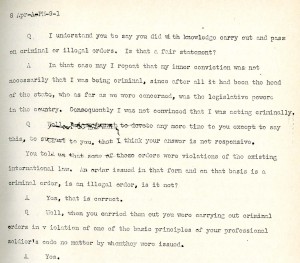3 April 46
DR. NELTE (Counsel for the Defendant Keitel): …But you are not only a soldier, you are also an individual with a life of your own. When facts brought to your notice in your professional capacity seemed to reveal that a projected operation was unjust, did you not give it consideration?
KEITEL: I believe I can truthfully say that throughout the whole of my military career I was brought up, so to speak, in the old traditional concept that one never discussed this question. Naturally, one has one’s own opinion and a life of one’s own, but in the exercise of one’s professional functions as a soldier and an officer, one has given this life away, yielded it up. Therefore I could not say either at that time or later that I had misgivings about questions of a purely political discretion, for I took the stand that a soldier has a right to have confidence in his state leadership, and accordingly he is obliged to do his duty and to obey. [http://avalon.law.yale.edu/imt/04-03-46.asp#keitel1, accessed 4/5/2016]
Sir David Maxwell-Fyffe led the cross examination of Keitel once Dr. Nelte had completed the case for the defense. Using captured documents and statements made during interrogation depositions conducted in the Fall of 1945, Maxwell-Fyffe prompted Keitel through his recollections of meetings at which the invasions of Austria and Czechoslavakia were discussed. Keitel’s reactions and actions to orders concerning prisoners of war as well as conduct of the citizenry vis a vis downed pilots were of particular interest. At the conclusion of the British cross-examination, Dodd asked permission to question the defendant.
Q: Well, when you were carrying them out you were carrying out criminal orders in violation of one of the basic principles of your professional soldier’s code no matter by whom they were issued.
A: Yes.
As he exultantly wrote to Grace that evening, “he practically admitted his guilt.” [p. 282, 4/8/1946]
–Owen Doremus and Betsy Pittman
[Owen Doremus, a junior at Edwin O. Smith High School, is supporting this blog series with research and writing as part of an independent study.]
The majority of the letters from Tom Dodd to his wife Grace have been published and can be found in Letters from Nuremberg, My father’s narrative of a quest for justice. Senator Christopher J. Dodd with Lary Bloom. New York: Crown Publishing, 2007.
Images available in Thomas J. Dodd Papers.

